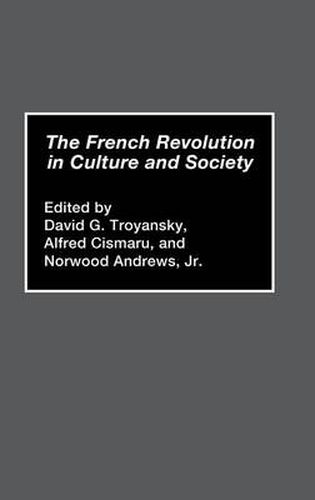Readings Newsletter
Become a Readings Member to make your shopping experience even easier.
Sign in or sign up for free!
You’re not far away from qualifying for FREE standard shipping within Australia
You’ve qualified for FREE standard shipping within Australia
The cart is loading…






This volume examines the issue of the timing of cultural change, problems of Revolutionary anticipations and reverberations, and the relationship between culture, politics, and society. Individual essays combine both old and new approaches, ranging from textual analysis to the study of local judicial records, from the psychohistorical to the demographic. But they all demonstrate the usefulness of linking social and cultural history, broadly conceived, and of interdisciplinary approaches to the study of events. The creation of French Revolutionary culture is addressed. The contributors describe the physical act of dismantling and redefining the culture of the Ancien Regime for revolutionary purposes, new conceptions of time, and generation relations in Revolutionary rhetoric and law. The second part identifies key cultural ingredients from the distant past. It reminds us of the extent to which the Revolution employed the huge storehouse of Western culture to create something original. Three essays see the Revolutionary era as engendering psychological dislocation and social historians reveal the variety of approaches they have taken in trying to understand 18th-century France. The varied contributions exploit the sources that have become the stock-in-trade of modern social history. Poverty, crime, and population are among the leading topics in current historiography, but military and political institutions are also examined in new ways.
$9.00 standard shipping within Australia
FREE standard shipping within Australia for orders over $100.00
Express & International shipping calculated at checkout
This volume examines the issue of the timing of cultural change, problems of Revolutionary anticipations and reverberations, and the relationship between culture, politics, and society. Individual essays combine both old and new approaches, ranging from textual analysis to the study of local judicial records, from the psychohistorical to the demographic. But they all demonstrate the usefulness of linking social and cultural history, broadly conceived, and of interdisciplinary approaches to the study of events. The creation of French Revolutionary culture is addressed. The contributors describe the physical act of dismantling and redefining the culture of the Ancien Regime for revolutionary purposes, new conceptions of time, and generation relations in Revolutionary rhetoric and law. The second part identifies key cultural ingredients from the distant past. It reminds us of the extent to which the Revolution employed the huge storehouse of Western culture to create something original. Three essays see the Revolutionary era as engendering psychological dislocation and social historians reveal the variety of approaches they have taken in trying to understand 18th-century France. The varied contributions exploit the sources that have become the stock-in-trade of modern social history. Poverty, crime, and population are among the leading topics in current historiography, but military and political institutions are also examined in new ways.